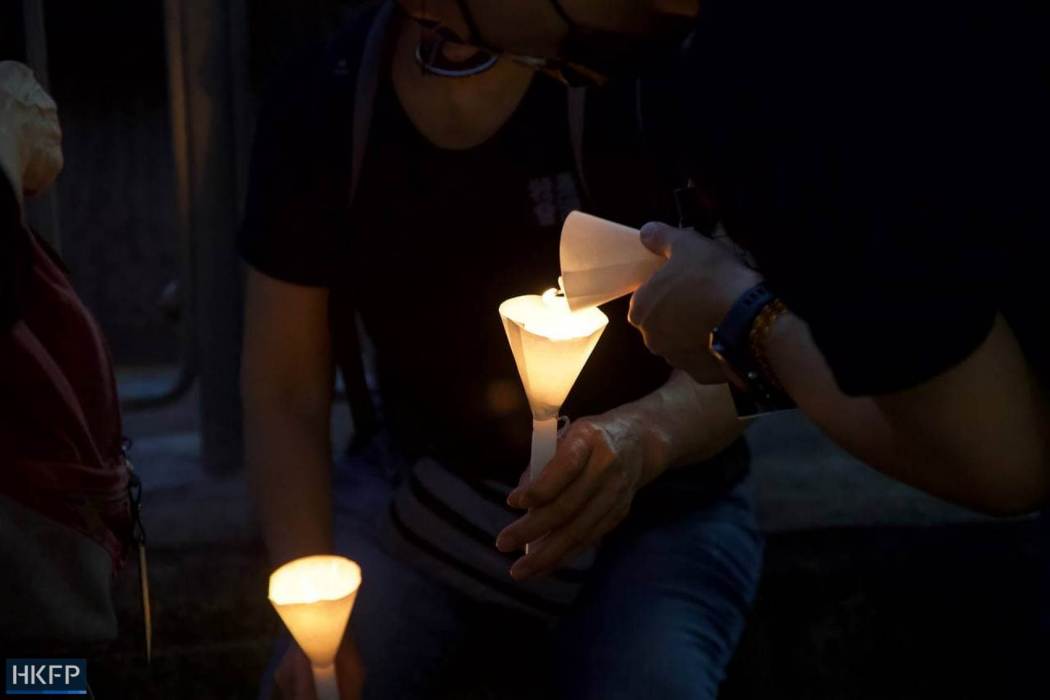Hong Kong Christian newspaper runs blank front page ahead of Tiananmen crackdown anniversary
The weekly Christian Times wrote in its latest issue, seen online Saturday ahead of the Tiananmen anniversary on Tuesday, that it “can only respond to the current situation by turning paragraphs into blank squares and white space,” adding that society has become “restrictive.”
A Hong Kong Christian newspaper has left its front page mostly blank ahead of the 35th annversary of China’s 1989 crackdown on protesters in Tiananmen Square, as concerns mount about dwindling freedoms in the city.

Christian Times’ June 2, 2024 issue. Photo: Christian Times, via screenshot.
The weekly Christian Times wrote in its latest issue, seen online Saturday, that it “can only respond to the current situation by turning paragraphs into blank squares and white space”, adding that society has become “restrictive”.
Hong Kong used to be the only place on Chinese soil where people could openly mourn those who died on June 4, 1989, when the government sent troops and tanks to crush democracy demonstrations in Beijing.
But public forms of commemoration such as candlelight vigils have been banned or driven underground as Beijing imposed a national security law on the city in 2020.
Hong Kong this week arrested seven people for sedition, accusing them of making social media posts that “took advantage of an upcoming sensitive date”.
The Christian Times usually publishes Tiananmen-related content ahead of every anniversary, but this year said its front page could not be printed “due to an issue”.

The weekly Christian Times wrote in its latest issue, seen online Saturday, that it “can only respond to the current situation by turning paragraphs into blank squares and white space”, adding that society has become “restrictive”.
Hong Kong used to be the only place on Chinese soil where people could openly mourn those who died on June 4, 1989, when the government sent troops and tanks to crush democracy demonstrations in Beijing.
But public forms of commemoration such as candlelight vigils have been banned or driven underground as Beijing imposed a national security law on the city in 2020.
Hong Kong this week arrested seven people for sedition, accusing them of making social media posts that “took advantage of an upcoming sensitive date”.
The Christian Times usually publishes Tiananmen-related content ahead of every anniversary, but this year said its front page could not be printed “due to an issue”.

Candles lit near Victoria Park on June 4, 2021. Photo: Jimmy Lam/HKFP.
“In recent years, Hong Kong’s society has changed drastically and become more restrictive,” the paper said in an editorial published along with another mostly redacted article.
“Even a prayer based on historical memories may arouse ‘concern’.”
Hong Kong bishop Stephen Chow called this week for forgiveness and healing in an article that obliquely referenced the June 4 anniversary.
“It is still a sore spot that needs to be properly addressed… Nevertheless, I realise that I cannot wait and must instead move forward,” Chow wrote.
A Catholic mass to commemorate victims of the Tiananmen crackdown — held annually for more than three decades — was axed in 2022 after organisers said they feared violating Hong Kong law.
Hong Kong authorities have said the national security law was needed to stop violence and restore order after massive pro-democracy protests in 2019, while critics have accused the law of curtailing fundamental freedoms.
“In recent years, Hong Kong’s society has changed drastically and become more restrictive,” the paper said in an editorial published along with another mostly redacted article.
“Even a prayer based on historical memories may arouse ‘concern’.”
Hong Kong bishop Stephen Chow called this week for forgiveness and healing in an article that obliquely referenced the June 4 anniversary.
“It is still a sore spot that needs to be properly addressed… Nevertheless, I realise that I cannot wait and must instead move forward,” Chow wrote.
A Catholic mass to commemorate victims of the Tiananmen crackdown — held annually for more than three decades — was axed in 2022 after organisers said they feared violating Hong Kong law.
Hong Kong authorities have said the national security law was needed to stop violence and restore order after massive pro-democracy protests in 2019, while critics have accused the law of curtailing fundamental freedoms.
No comments:
Post a Comment